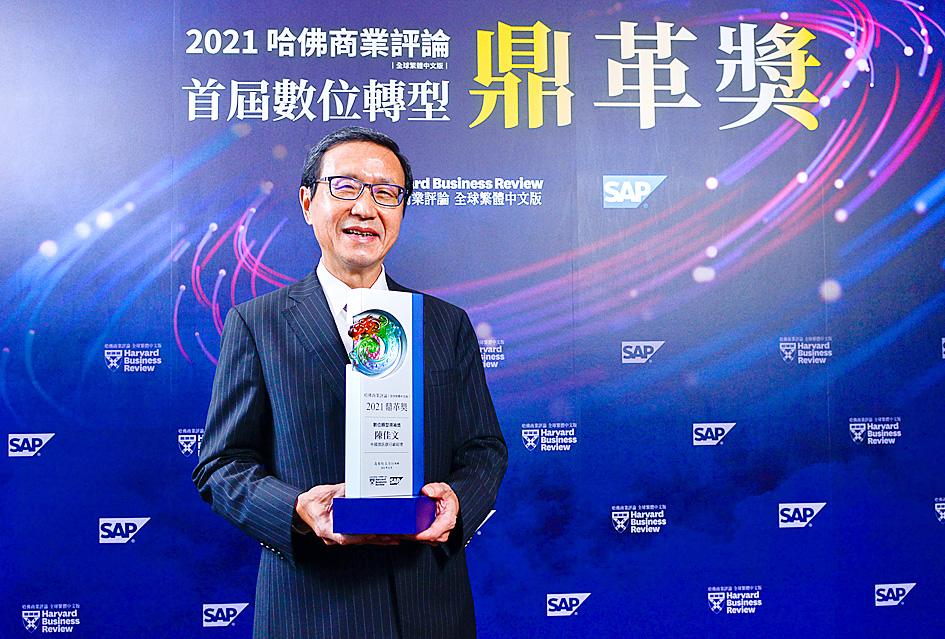CTBC Bank (中國信託銀行) last week won three awards at the first Harvard Business Review Complex Chinese Edition Digital Transformation Award for its efforts in promoting digital innovation.
At a ceremony on Wednesday, CTBC president James Chen (陳佳文) was awarded the Digital Transformation Leader Award, while CTBC Bank was honored with the Integrated Digital Transformation Pioneer Award in the service sector and the bank’s online loan platform received the Operational Excellence and Transformation Award.
The award organizer praised CTBC for innovating and promoting digital transformation, and its success in connecting diversified consumer ecosystems by modeling various financial scenarios.

Photo courtesy of CTBC Bank
Awarding Chen with the Digital Transformation Leader Award recognizes his role as a key player in the bank’s digital transformation, it said.
To meet customers’ expectations, Chen not only transformed the overall banking service experience, but also integrated the organization to improve efficiency, creating an agile and innovative digital concept and environment, while leading his colleagues to work together, it added.
Chen said banks must always provide services that are readily available.
“From the perspective of customers, providing a good digital financial experience and completely transforming existing businesses is what we must do,” he said.
“In addition, CTBC has a diversified organization, with various units responsible for the front, middle and back offices, where the working habits and personality traits of technology and finance talent are quite different. Therefore, the role of the president is to allow everyone to collaborate smoothly, to provide colleagues of different cultures with the greatest flexibility, and to keep them united to work together toward a common goal,” he added.
The COVID-19 pandemic has accelerated customer demand for digital finance, and CTBC said its vision for digital transformation includes two major goals: digital end-to-end services and banking everywhere.
To achieve the digital end-to-end goal, the bank redefined and redesigned its financial service process, and constructed a smooth, efficient and valuable customer experience based on the perspective of customers.
To reach the goal of banking everywhere, it adopted a cross-industry alliance strategy, providing financial services in daily life, so customers do not need to go to physical branches and can use the bank’s services anytime and anywhere.
CTBC’s online loan platform, which won the Operational Excellence and Transformation Award, is to make customer needs its core focus, and optimize customer service, application review and operation procedures, with the aim of establishing a complete database system and striving to develop more personalized services.

The US dollar was trading at NT$29.7 at 10am today on the Taipei Foreign Exchange, as the New Taiwan dollar gained NT$1.364 from the previous close last week. The NT dollar continued to rise today, after surging 3.07 percent on Friday. After opening at NT$30.91, the NT dollar gained more than NT$1 in just 15 minutes, briefly passing the NT$30 mark. Before the US Department of the Treasury's semi-annual currency report came out, expectations that the NT dollar would keep rising were already building. The NT dollar on Friday closed at NT$31.064, up by NT$0.953 — a 3.07 percent single-day gain. Today,

‘SHORT TERM’: The local currency would likely remain strong in the near term, driven by anticipated US trade pressure, capital inflows and expectations of a US Fed rate cut The US dollar is expected to fall below NT$30 in the near term, as traders anticipate increased pressure from Washington for Taiwan to allow the New Taiwan dollar to appreciate, Cathay United Bank (國泰世華銀行) chief economist Lin Chi-chao (林啟超) said. Following a sharp drop in the greenback against the NT dollar on Friday, Lin told the Central News Agency that the local currency is likely to remain strong in the short term, driven in part by market psychology surrounding anticipated US policy pressure. On Friday, the US dollar fell NT$0.953, or 3.07 percent, closing at NT$31.064 — its lowest level since Jan.

The New Taiwan dollar and Taiwanese stocks surged on signs that trade tensions between the world’s top two economies might start easing and as US tech earnings boosted the outlook of the nation’s semiconductor exports. The NT dollar strengthened as much as 3.8 percent versus the US dollar to 30.815, the biggest intraday gain since January 2011, closing at NT$31.064. The benchmark TAIEX jumped 2.73 percent to outperform the region’s equity gauges. Outlook for global trade improved after China said it is assessing possible trade talks with the US, providing a boost for the nation’s currency and shares. As the NT dollar

The Financial Supervisory Commission (FSC) yesterday met with some of the nation’s largest insurance companies as a skyrocketing New Taiwan dollar piles pressure on their hundreds of billions of dollars in US bond investments. The commission has asked some life insurance firms, among the biggest Asian holders of US debt, to discuss how the rapidly strengthening NT dollar has impacted their operations, people familiar with the matter said. The meeting took place as the NT dollar jumped as much as 5 percent yesterday, its biggest intraday gain in more than three decades. The local currency surged as exporters rushed to